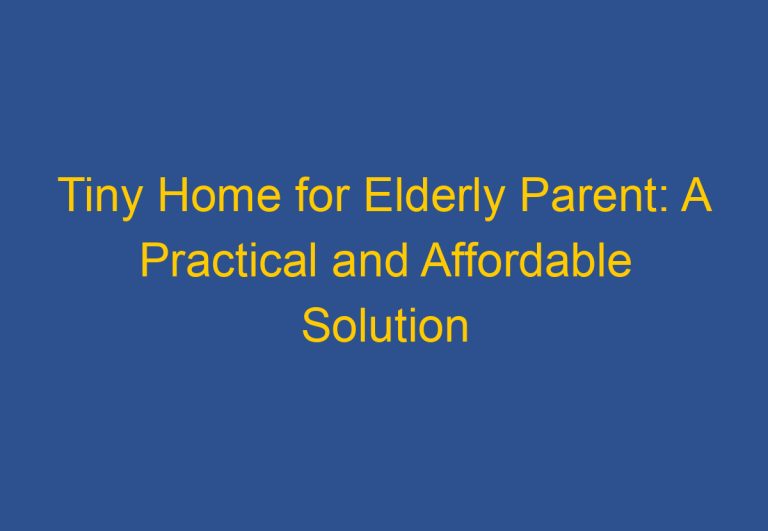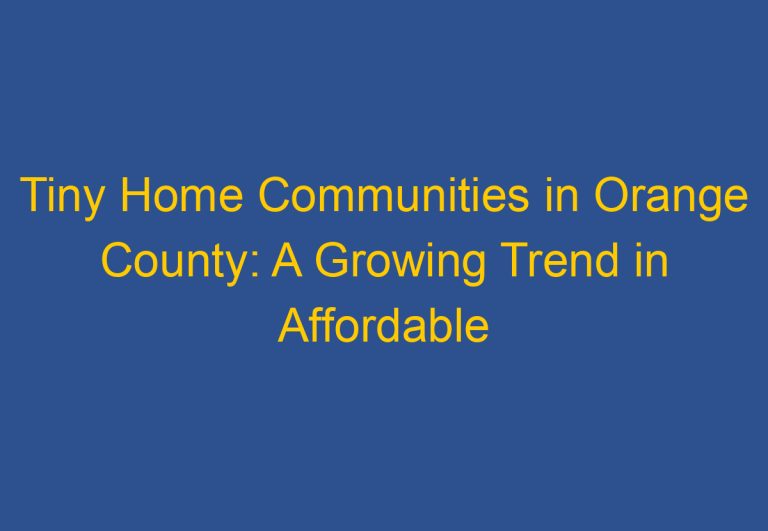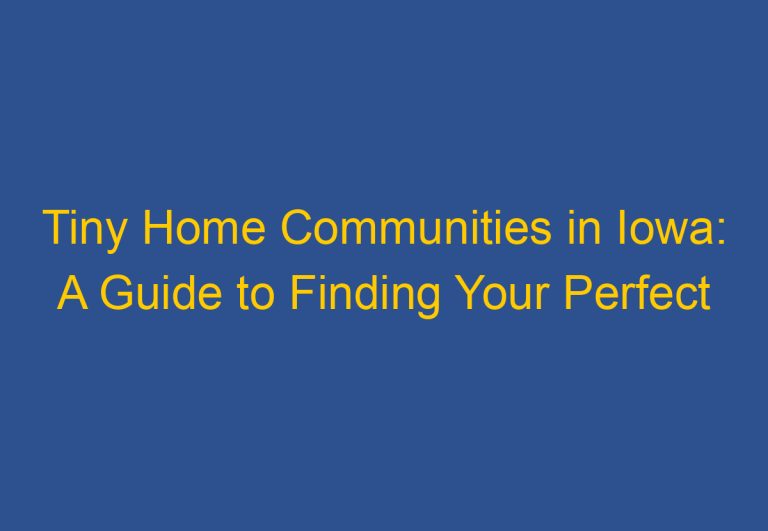Tiny Mobile Homes for Seniors: A Practical and Affordable Housing Solution
As people age, they often look for ways to downsize and simplify their lives. One popular option for seniors is the tiny home movement. Tiny homes are small, often mobile, houses that are designed to be affordable and efficient. They offer seniors the opportunity to live independently while still having a sense of community and connection to others.
The tiny home movement has gained popularity in recent years, and many seniors are taking notice. With the cost of traditional homes and apartments skyrocketing, tiny homes offer an affordable alternative. In addition, tiny homes are often designed with seniors in mind, with features like grab bars and easy-to-use appliances. They also offer the opportunity to live a simpler, more sustainable lifestyle, which can be appealing to retirees looking to reduce their carbon footprint.
Design and Customization
Tiny mobile homes are an excellent option for seniors who want to downsize and simplify their lives. These homes can be customized to meet the specific needs of seniors, providing them with a comfortable and safe living space. In this section, we will discuss some of the design and customization options available for tiny mobile homes for seniors.
Maximizing Space in Tiny Homes
One of the most significant challenges when designing a tiny mobile home is maximizing the available space. Seniors need enough space to move around comfortably, and the design should ensure that the space is used efficiently. Some ways to maximize space in tiny homes include using multi-functional furniture, built-in storage, and custom cabinetry. Additionally, the floor plan should be designed in a way that maximizes the available space, with a focus on creating an open and airy feel.
Accessibility Features
Seniors require accessibility features in their homes to ensure that they can move around comfortably and safely. Some accessibility features that can be incorporated into tiny mobile homes include wider doorways, non-slip flooring, grab bars, and wheelchair access. The floor plan should also be designed to ensure that seniors can move around easily, with a focus on creating an open and accessible living space.
Safety and Comfort
Safety and comfort are essential considerations when designing tiny mobile homes for seniors. The home should be designed to provide natural light, insulation, and ventilation to ensure that the living space is comfortable and safe. Additionally, the home should be equipped with safety features such as smoke detectors, fire extinguishers, and carbon monoxide detectors. The bathroom and kitchen should also be designed with safety in mind, with non-slip flooring and grab bars installed where necessary.
In conclusion, designing a tiny mobile home for seniors requires careful consideration of their specific needs and requirements. The home should be designed to maximize space, provide accessibility features, and ensure safety and comfort. With the right design and customization options, seniors can enjoy a comfortable and safe living space in a tiny mobile home.
Living Off-Grid and Mobility
Living off-grid in a tiny mobile home can provide seniors with a sustainable and eco-friendly lifestyle. With the use of solar panels, water collection, and other eco-friendly solutions, seniors can reduce their carbon footprint and live a more sustainable life.
Sustainable Living
Seniors who choose to live off-grid in a tiny mobile home can enjoy a more sustainable lifestyle. By using solar panels, seniors can generate their own electricity and reduce their reliance on the grid. Additionally, water collection systems can help seniors collect and use rainwater, reducing their reliance on municipal water supplies.
Legal and Zoning Considerations
Seniors who are interested in living off-grid in a tiny mobile home should be aware of local zoning and regulations. Some areas may have restrictions on the use of tiny homes, backyard cottages, or mobile homes. Seniors should research local regulations and obtain any necessary permits before moving into a tiny mobile home.
Overall, living off-grid in a tiny mobile home can provide seniors with a sustainable and eco-friendly lifestyle. However, seniors should be aware of legal and zoning considerations and obtain any necessary permits before moving into a tiny mobile home.
Frequently Asked Questions
What are the best options for affordable tiny mobile homes suitable for seniors?
Seniors looking for affordable tiny mobile homes have many options to choose from. They can consider purchasing pre-built tiny homes, custom-built tiny homes, or DIY tiny homes. Pre-built tiny homes are the most popular option, and they can be found from various manufacturers. They are available in different sizes, styles, and price ranges. Custom-built tiny homes are also an option, but they can be more expensive. DIY tiny homes are the most affordable option, but they require more time and effort to build.
How can seniors find tiny mobile homes for sale in their area?
Seniors can find tiny mobile homes for sale in their area by doing a simple online search or by contacting a local real estate agent. Many tiny home manufacturers have websites where they list their available models and prices. Seniors can also attend tiny home shows or visit tiny home communities to see what is available.
What features are available in tiny homes that are designed for accessibility for seniors with disabilities?
Many tiny homes are designed to be accessible for seniors with disabilities. Some of the features available in these homes include wheelchair ramps, wider doorways, grab bars, and lower countertops. Some tiny homes also have roll-in showers, raised toilets, and other features that make them easier to navigate for seniors with mobility issues.
Are there specific communities or locations in Pennsylvania where seniors can legally reside in a tiny home?
There are specific communities and locations in Pennsylvania where seniors can legally reside in a tiny home. However, it is important to check with local zoning and building codes to ensure that the tiny home meets all the legal requirements. Some communities may have restrictions on the size of the tiny home or the type of foundation it can be built on.
Can seniors live permanently in a tiny home, and what are the regulations surrounding this?
Seniors can live permanently in a tiny home, but the regulations surrounding this vary by location. Some areas allow tiny homes to be used as permanent residences, while others only allow them to be used as vacation homes or temporary housing. Seniors should check with their local zoning and building codes to ensure that they are complying with all the regulations.
How do the costs of living in a tiny home compare to traditional mobile homes or trailers for seniors?
The costs of living in a tiny home can vary depending on the size, location, and features of the home. However, in general, living in a tiny home can be more affordable than living in a traditional mobile home or trailer. Tiny homes are often more energy-efficient, which can result in lower utility bills. They also require less maintenance and upkeep, which can save seniors money in the long run.










